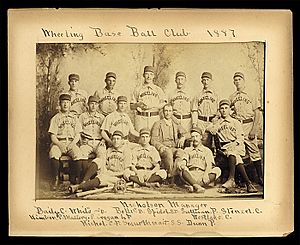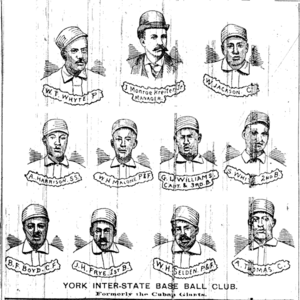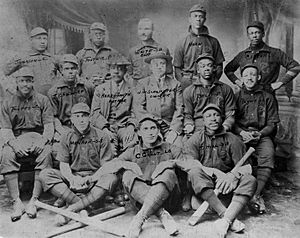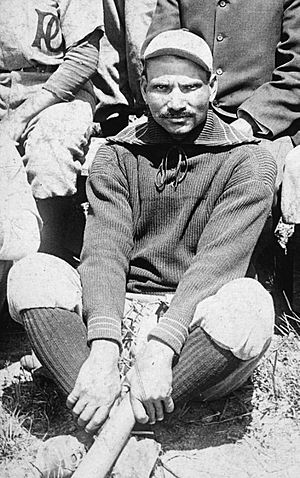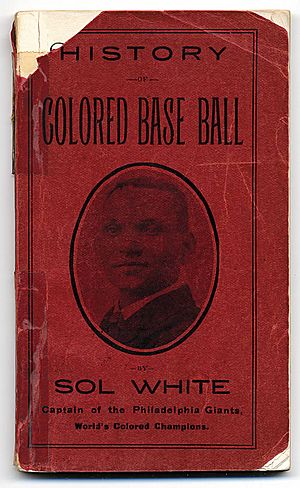Sol White facts for kids
Quick facts for kids Sol White |
|||
|---|---|---|---|
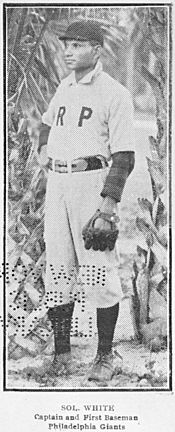 |
|||
| Second baseman, manager | |||
| Born: June 12, 1868 Bellaire, Ohio |
|||
| Died: August 26, 1955 (aged 87) Central Islip, New York |
|||
|
|||
| debut | |||
| 1887, for the Pittsburgh Keystones | |||
| Last appearance | |||
| 1926, for the Newark Stars (coach) | |||
| Teams | |||
|
|||
| Career highlights and awards | |||
Negro league baseball
|
|||
| Induction | 2006 | ||
| Election Method | Committee on African-American Baseball | ||
King Solomon "Sol" White (born June 12, 1868 – died August 26, 1955) was a very important person in early baseball. He was a great player, a smart manager, and a leader in the Negro leagues. Sol White also wrote the very first book about the history of black baseball in 1907. Because of his huge impact, he was put into the Baseball Hall of Fame in 2006.
Contents
Sol White's Early Life
Sol White was born in Bellaire, Ohio, in 1868. His family came from Virginia. Sol's father passed away when Sol was very young. His mother, Judith, worked hard as a "washer woman" to support Sol and his four brothers and sisters.
Sol loved baseball from a young age. He learned to play when he was just a kid.
Sol White's Playing Career
When Sol was a teenager, he was a big fan of a local amateur team called the Bellaire Globes. One day, a player on the Globes got hurt. Since everyone knew Sol could play, the captain let him join the game! Sol always remembered that game. The captain of the other team was Ban Johnson, who later became a very famous president of the American League.
Sol quickly became known as a talented baseball player. By the time he was 16, many team managers wanted him to play for them. He started as a shortstop but became a great all-around player. He could play almost any position, from catcher to right field.
In 1887, he joined the Pittsburgh Keystones. He was hitting really well, with a batting average of .308. After that league stopped, he played for the Wheeling Green Stockings in the Ohio State League. He was an amazing hitter there, batting .370!
Facing Challenges in Baseball
After the season, the Ohio State League changed its name and decided to ban black players. This meant Sol White and other African American players couldn't play. Weldy Walker, another black player, wrote a strong letter to protest this unfair rule. The league soon changed its mind and allowed black players again.
However, the Wheeling team's manager refused to let Sol play. So, Sol rejoined the Pittsburgh Keystones. He played in a "Colored Championship" tournament in New York City.
Sol continued to play for many different teams. In 1889, he played for the New York Gorhams, playing both catcher and second base. In 1890, he joined the York Colored Monarchs, where he hit .350 and stole 21 bases. He even played for the "Big Gorhams" of New York, a team he later called one of the strongest ever.
In 1895, Sol played second base for the Page Fence Giants, a famous barnstorming team. He batted an incredible .404 that year! The Giants had an amazing record, winning 118 games and playing in many towns across seven states.
Balancing Baseball and College
In 1896, Sol White went to Wilberforce University to study theology. For the next four years, he played professional baseball in the summer with the Cuban X-Giants and studied in college during the fall and winter. He was even listed as an athletic instructor at Wilberforce in 1900.
After playing for the Chicago Columbia Giants and the Cuban X-Giants, Sol moved to Philadelphia. There, he helped start the Philadelphia Giants baseball team. He started playing less as he focused more on managing the team.
Sol White's Managerial Career
In 1902, Sol White helped create the Philadelphia Giants. He was the team's captain and manager. At first, the players shared the profits, but in 1903, Sol changed it so all players earned a salary.
In 1903, the Giants lost a championship playoff. But the next year, Sol signed two amazing players: pitcher Rube Foster and outfielder Pete Hill. With these new players, the Philadelphia Giants won the championship series!
For 1905, Sol brought in another great player, Home Run Johnson. Sol believed this made the Philadelphia Giants "the strongest organization of the time." They won 134 out of 158 games! A powerful baseball promoter named Nat Strong said the 1904-1905 Philadelphia Giants were "the best team in the history of the game."
Even though they lost some star players, the Giants kept winning. In 1906, they won the "colored championship." In 1907, Sol brought in future Hall of Famer John Henry Lloyd. The Giants finished first in an all-black league. This meant the Philadelphia Giants had won the black professional championship for four years in a row!
After a disagreement, Sol White left the Philadelphia Giants in 1909. He managed other teams like the Philadelphia Quaker Giants and the Brooklyn Royal Giants. In 1911, he managed the new New York Lincoln Giants and brought together many top players. He even got star rookie players Dick Redding and Louis Santop from his old team, which caused the Philadelphia Giants to disband.
Sol also managed a team in the Cuban League during the winter season. After managing a team called the Boston Giants, Sol White retired from baseball and went back to his hometown.
He returned to baseball in 1921 to work for the Columbus Buckeyes. He helped bring his old player, John Henry Lloyd, to the team as a player-manager. Sol had two more managing jobs in Cleveland before his last job as a coach for the Newark Stars in 1926.
Sol White's Writings on Negro League Baseball
Sol White is very famous for writing a book called History of Colored Base Ball in 1907. It was a small, 128-page book sold at Philadelphia Giants games.
The book started by talking about the first professional black baseball team in 1885. It explained how black players were removed from mostly white teams and how "colored base ball" grew stronger. This book was like a history book, a record book, and a "who's who" of African American baseball up to 1907.
The book also had chapters on topics like "Colored Baseball as a Profession" and "The Color Line." Some of Sol's former players, like Rube Foster and Home Run Johnson, even wrote chapters about pitching and hitting. The book also had 57 photos of players, managers, and owners, many of which can't be found anywhere else.
Sol White's History of Colored Base Ball was the first book ever written about black professional baseball. It was the only one for over 60 years! Today, only five copies of this important book are known to exist.
Sol White continued to write about baseball for black newspapers like the Cleveland Advocate, the New York Age, and the New York Amsterdam News. He wanted to publish a second book to update the history of black baseball, but it never happened.
Sol White's Personal Life
Sol White married Florence Fields in 1906. They had a daughter named Marion who lived to adulthood.
When Sol White was inducted into the Baseball Hall of Fame in 2006, no family members were there. So, the Commissioner of Baseball, Bud Selig, accepted his award for the family.
Sol White's Death
Sol White passed away at age 87 in Central Islip, New York. He was buried in an unmarked grave in Frederick Douglass Memorial Park in Staten Island, New York City. In 2014, a special project placed a new headstone at his grave. He is the only Hall of Famer buried on Staten Island.
See also


